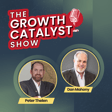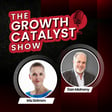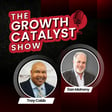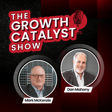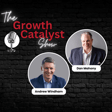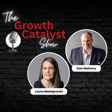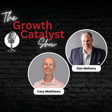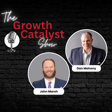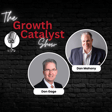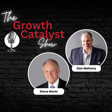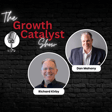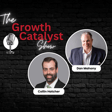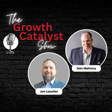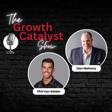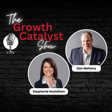Become a Creator today!Start creating today - Share your story with the world!
Start for free
00:00:00
00:00:01

Navigating the Road to Success: Conversation with Rob Swartwood
Dive into the unique world of Rob Swartwood, founder of Consilium by Swartwood LLC, where the distinctive blend of legal expertise and military training takes business growth, leadership, and mentorship to new heights. Uncover how Rob's foundation in military service has shaped his methodology in empowering entrepreneurs and navigating the complex legal landscape of mergers and acquisitions. Explore how the right mentorship, fused with the principles of discipline and strategy from Rob's time in the army, can fuel both personal and professional development, transcending conventional boundaries.
Transcript
Introduction and Guest Overview
00:00:00
Speaker
Welcome to the Growth Catalyst Show where we believe that growth can come in many forms, professional, personal, company, sales, you name it. I'm your host, Dan Mahoney, founder of Transcendent Sales Solutions and a guide to a world of growth possibilities. I've spent my career empowering companies and their people with strategies that accelerate growth. I'm here to bring you stories of these business leaders and their trusted advisors to gain insights into their journeys and learn how they fueled their own growth. Just maybe their journey could become part of your own growth story. Are you ready? Let's grow.
00:00:34
Speaker
Welcome to The Growth Catalyst Show. I'm your host, Dan Mahoney. My next guest is Rob Swartwood. He's the managing member of Consilium by Swartwood LLC, a boutique corporate mergers and acquisition law firm. His methodical problem solving approach, commitment to excellent and passion. for serving others, have the extinguished him as one of the top corporate attorneys in Atlanta. With this unique blend of expertise as an industry officer, corporate M and&A attorney and entrepreneur, Rob brings valuable insights to his clients. Rob, welcome to the Growth Catalyst Show. Thanks, Dan. Appreciate you having me. It's great to be with you today. I'm i'm enjoying our, i'm I'm looking forward to speaking to you and having our conversation today. So ah tell me a little bit about you.
Rob Swartwood's Background and Military Experience
00:01:16
Speaker
Tell me where you're from.
00:01:17
Speaker
ah A small farming town just outside of Flint, Michigan, a little town called Clio, not Cleo, but Clio, Michigan is the name of the place. I've never heard of Clio. I've been to Flint, Michigan. and you got and And once you've been to Flint, Michigan, you never forget that you've been there. So it's definitely, but I, so, ah but yeah, um I didn't know that you were from Michigan. So yeah big blue or you big blue guy? My father went to the University of Michigan. I went to the University of Michigan for a year. So between Michigan and Michigan State, I'm um'm a Michigan fan, but I've lived in the South now for almost as long as I lived in the North. And unfortunately, my football allegiances have have changed. Go Dogs. Go Dogs. That's right. All right. So what brought you what brought you down to Atlanta?
00:02:10
Speaker
it's a It's an interesting story. um i had I had a couple things happen to me when I was a young man. ah Very early, about eight, I knew I was going to be in the military and I was going to do all that. My my dad um was was actually in the military. His military career eclipsed mine. So I used to come to Georgia during the summers with my dad. And about five years after I had that premonition that I was going to be in the military too, I had this premonition in Columbus, Georgia, that I was going to marry a girl from Georgia. And lo and behold, ah and in 2000, I met my wife, ah who was a blind date for me in college.
00:02:57
Speaker
um i we just wanted to you know I just a date for the weekend, but I i graduated from college. I became ah an army officer. I ended up proposing to her. She's from Georgia. I was in the military. I left the military, ah went to law school here in Georgia, and this is where we've decided to stay. So I can't say that it was because I had that premonition as a 13-year-old, but it is interesting that I but i did. and And this is where I ended up. So that's the long and short of it. I married into the South, I guess.
00:03:34
Speaker
Well, and, and, and like many, many of us were all transplants here. My, my wife, uh, who I met married 15 years ago was actually from here. I'm like, you're one of the first person that I've met 15 years ago. That's actually from here. So we're transplants. So now you I, first of all, thank you, your father and you for your service. Um, you, you, you went to West Point and were an infantry officer. And man, that's no joke. I mean, you know, infantry, I mean, And especially the times you served I was looking 2001 to june 2001 to january 2008 is when you
Transition from Military to Law
00:04:10
Speaker
were full time. Is that correct? That's right. Yeah, actually it was a little bit less than that. I was in the georgia guard for the last 17 months. So I left active duty in september of 06 And was in the georgia guard from september of 06 to january 08 but yeah active duty from june of 01 to september 06
00:04:32
Speaker
And I just think about that time, 2001, and just what happened three months later, and it had to be like, there had to be one of those moments going, oh crap. Yeah, it was it was crazy. um we were we were on a field problem ah just outside of Columbus at Fort Benning. And I actually heard about September 11th through the a military radio. So you you've got this, you know, the military communication systems. And we were able to tap into like the local CBS affiliate and basically listen to the news on our, on our Synguards radios.
00:05:13
Speaker
And that's how we heard about September 11. I didn't actually see a picture of what happened for I think it was three days. We didn't get out of the field until Friday of that week. So we knew something significant had happened. We knew there would be a U.S. response. And most of us were brand new second lieutenants who were headed out to infantry platoons in the army And we we all knew like things just got real. We're not we're not just training for You know our our basic in infantry officer training We're now training to do the job that you know, we're probably going to very soon be doing so it definitely brought a different um
00:05:52
Speaker
a different sense of responsibility and and kind of sobriety to the whole mix. I think when you when you know like we're not just training, this is gonna be our reality here soon. it It definitely changes the dynamic. And you had a couple deployments I think you've told me before, correct? Right, that's right. Yeah, Afghanistan and Iraq. Oh, well, I mean, we could probably talk about your military service forever, but sure you know I'm sure that i'm sure that um you know guided you. Did you do the law school before or after? Probably after you got out of the military full-time, correct? Yeah. so i
00:06:30
Speaker
i After several overseas tours, i I kind of had the sense like, I i don't think I'm going to do this for 20 years, which was ah very different than what I thought would be happening when I graduated from West Point. and When I graduated from college, I i was the guy that everybody thought was going to serve for a lifetime. Um, I graduated second in my class militarily. Uh, I was just kind of gung-ho on the military stuff and uh, I obviously got out and did it and I realized this is a good way to start my life and I don't have any regrets about my service But you know combat has a way of putting life into perspective And it was very clear to me that this is not what i'm supposed to do for the rest of my life. So Law school wasn't even on the radar. Um
00:07:21
Speaker
ah probably three months, or excuse me, three years into my into my career as an officer, i I began to think about what I would do if I left.
Corporate Law and Business Insights
00:07:31
Speaker
And um I didn't really want to go into business. My dad went to law school kind of late in life. um when i When I started college, actually, he went back to law school. And I just thought, you know, it's a safe degree to get, and I'm not really sure what I would do with it, but lawyers, you know, probably have a probably make a decent living and have a decent life. I'll i'll try that. And it really kind of was that that that thought process that ultimately led me to apply. um i I did leave the military to go to law school. I didn't ah didn't go to school when I was still serving.
00:08:11
Speaker
Um, but but yeah, that's kind of how how the transition happened Um, I I heard you interview another lawyer recently and You know, he he kind of he was a real estate lawyer and he mentioned that, you know He didn't really know he wanted to get into real estate law. I was kind of the same uh in respect of corporate law, um i didn't I didn't go to law school with an understanding of what I wanted to do. i Instead, I went to law school with an understanding of what I didn't want to do. um I didn't want to litigate. I didn't want to do criminal work, and I didn't want to do domestic or or divorce work. But I was was kind of open to everything else. So ah my career story is kind of backing into what I ultimately do versus having an intention from the outset that this is where I would end up.
00:09:03
Speaker
I'm sure that your military career really has shaped you and your profession as an attorney. Well, when I went to law school, i i had been had I had five years of life experience that was very different than most people who I was in law school with. And when I started practicing law, I was a little bit older. and And it really was that life experience that I think did give me an advantage. um Obviously I work with business owners, executives, entrepreneurs now. And you know when I was in the military, that was my job. I you know commanded a rifle platoon. I commanded a rifle company. I worked in long range surveillance. i I was an operator.
00:09:50
Speaker
uh, much like the clients that I represent right now. Um, and I think that's my heart. That's always been my heart. So it did give me, I think it gave me probably a little bit of a leg up because I could relate to my clients and the business owners that I was working with. So yeah, I mean, I, I, I think it probably did help. I don't know that I was any more mature. I think we all are on our journey of maturity, but, uh, the law certainly does grow yet pretty quickly as well. You had a short tenure as kind of a corporate attorney. at What made you decide to start Consilium? Well, um, actually, gosh, um, so we, we, we have this joke in inside of our household. So I graduated from West Point in 2001, September 11th happened three, three months later. And I went to war within nine months of that.
00:10:42
Speaker
um I graduated from law school in June of 09 and began practice as a corporate attorney in the midst of an economic downturn. I knew I wanted to be an entrepreneur and I'll back into this story here in a minute, but I didn't know when I wanted to launch Consilium, but I chose to launch Consilium three weeks before the pandemic hit in 2020. So before I tell you the story, I just want to comment on my impeccable sense of timing and um how how you should never take advice about when to do things that are big in your life for me because I only choose to do them when they're very hard, apparently.
00:11:26
Speaker
But i mean that I mean, you think about it, three major events within a 20-year period, probably three of the most significant times in a 20-year period, and you had significant life changes before all those. That says a lot about Rob Swartwood. It says a lot. I don't know if it's a compliment. know It definitely is. I mean, you can, I mean, and again, I think that has a lot to do with your military training is you can, yeah you take what's in front of you and you're an operator. And that, I think it says a lot about you.
00:12:00
Speaker
Well, so i I did start practicing in 2009. I worked, I was fortunate enough to get a job. um A lot of my classmates from law school were deferred and some of them even lost their opportunities. ah So I was lucky to get a job. um Had a great initial experience. ah Worked with a firm for about four and a half years and and left that environment and went to you know a large ah large law firm, um quite honestly, where i I was able to get the kind of skill sets that would give me the ability to do the kind of work that I'm doing now independently. So I did that for, gosh, it was it was over 10 years. I did that for 11 years before I struck out on my own. the The driver, though, for starting Consilium,
00:12:51
Speaker
um you know without to so the The legal model is typically slow to catch up to the to the business reality. what ah What I saw practicing and working inside of large law firms is that they're very good at what they do, but they're large and they're cumbersome and they're costly and they're expensive. And our clients are smaller and they're more nimble and they're dynamic and they're cost sensitive. And they really need practical advice that's very effective that they can act upon right now to make the best decisions possible in many cases.
00:13:30
Speaker
in the most significant circumstances that they or their businesses have faced. So we have this we have this mission at Consilium where we help good people do difficult things with integrity and trust. And you know quite honestly, that what we set out to do is create the kind of law firm that we would want to hire if we were clients looking for corporate and business lawyers. That's the whole that's the whole deal. um We also decided you know kind of internally to create the kind of law firm that we would actually want to go and work for if we were brand new lawyers out of law school and wanted to work with a dynamic firm doing good and sophisticated work that actually helped move the needle for businesses in the middle market. So that that that was kind of the driving force, um obviously. And um um um' um I'm honest about it. I'm a baby business owner.
00:14:29
Speaker
um ah I've got a good bit of legal experience and a lot of life experience, but ah we've only been running Consilium for four years. um Running the business and serving the client, two totally different skill sets. So I'm still growing, I'm still learning. It's been a wildly exciting journey. I've not regretted it. I'm kind of ruined on law firms now. you know I don't think i would I could go to one because I i like ours. Um, but i'm having a lot of fun doing it and our team is growing and thriving and our and our clients are being blessed And um, it's been very rewarding to to have struck out So your firm is yeah, and well i'm going to talk about the mna in ah and a second, but you also do general counsel services, correct? Yeah, so You know, not everybody is transacting. Not everybody is doing a deal um, there are businesses that need the benefit of
00:15:27
Speaker
having a lawyer sit on the executive team, but you don't want to put that lawyer on the payroll, right? We try to posture ourselves as the legal conciglier for the business owner, the guy who sits on the board of directors of the executive team or the gal. um And it really helps be the the the person who lends the legal perspective to what business owners are facing. So yeah, that's kind of the other side of our business. We do a lot of transactions buy and sell side, but we also serve in this outside general counsel capacity that we think adds a lot of value to our clients day to day. Let's take a moment for a quick word from our sponsor.
00:16:08
Speaker
This episode of The Growth Catalyst Show was brought to you by Transcendent Sales Solutions. Whether your company is facing uncertainty, declining sales, or resource limitations, Transcendent Sales has the solution. Their team has decades of experience helping businesses find alignment to meet their growth goals in and transforming underperforming sales organizations into revenue producing market leaders. They take a hands on results oriented approach to solving sales challenges. Visit transcendence sales.com to learn more and subscribe to the biweekly growth catalyst newsletter for insightful growth strategies, transcendence sales solutions, empowering businesses to reach new heights. And now back to the show.
Navigating M&A for Small Businesses
00:16:47
Speaker
When you get into the M and&A side of it, ah you whether it's buy or sell, what are some of the you things you see and unique challenges you see business owners have as they're getting ready for this transaction? When I was, um my experience in big law was on the buy side mainly. We did some sell side transactions, but we mainly represented large strategic and financial acquires buying other businesses. In a lot of cases, those are smaller businesses. The SBA defines a small business as a business with a market cap, enterprise value of $100 million dollars or less.
00:17:23
Speaker
ah That's 99% of the businesses in the United States. so Let's be honest. you know Most of us who are talking about the middle market ah you know are working with what the SBA would call smaller businesses. We orient on working with businesses in the $10 to $100 million dollar enterprise value valuation range. and The reason that we do is this. When I was working inside of a large law firm ah representing the big guy, um we would we would have deals or encounters with smaller businesses that quite honestly were very impressive. ah Many of these businesses were started by one or two or three people who'd come together and taken significant risk, or perhaps it was a family concern that had been passed on generation to generation.
00:18:15
Speaker
And we saw we saw these people who were really good at what they were doing either selling a product or providing a service And yet they were engaged in the most significant financial transaction probably ah of their entire life And they were not well prepared in many cases and they were not well represented And you know you do that, you you sit on the other side of that for a long time. And I'm not saying that you know the by side is bad, but for me, I kind of watched the little guy get taken advantage of quite a bit. And I just thought, I had this thought one day and I said, you know what would happen if the if the little guy knew what I know?
00:19:03
Speaker
And what would it be like to impart what I know upon them long before they ever got into a position to sell? so then the i i mean Some of the foundation for Consilium was being born out of those ideas. Um, that's exactly what we did. I left I left big law and uh, I left it a very large firm in 2017 when we became ah an international Uh, uh law firm with 2400 lawyers in 61 different countries went to uh, not a small firm but a smaller firm and then ultimately transitioned out and started consilium with the idea that we would take the buy side playbook And everything that we had gained representing the big guy
00:19:48
Speaker
and we would help small business owners in their journey. um Whether that's working with them on a transaction that they've stumbled into, or maybe you've got a business owner who says, you know, in the next three to five years, I'm probably not going to be doing this, or I'd like to consider what a next step looks like. If you hire the right kind of advisors and the legal advisor is just one of them, but a business owner who says, you know what? Nobody gets to die with this thing. We're all going to transition from our businesses. I want to, I want to transition from this business as well as I have run it.
00:20:29
Speaker
That business owner, first of all, is brilliant. Second of all, they're going to have a great exit in a tremendous transaction if they hire the right kind of advisors to help them get the business ready for sale. So you asked me, you said, what what do I see? I still see a lot of businesses who need the assistance. of people who are skilled in this kind of work. I tell my clients all the time, you're really good at running your business. And the skill set that you have in doing that, I don't have, and I never will. But selling your business is nothing like running it.
00:21:06
Speaker
um We speak a different language. People who work in transactions every day speak a different language. We approach business deals very differently when the buying or the selling of a company is actually happening versus two parties are coming together for a commercial exchange. um and What we try to do is not just teach our clients what that sales process is all about. But we help them prepare themselves and their family and their company for it. And then we walk with them through the journey of selling their company because we want them to have an exceptional experience. Unfortunately, the statistics around selling your business and the satisfaction levels around that
00:21:49
Speaker
are incredibly low. I heard you interview another podcast participant recently who was talking about this, and I'll drill into the specifics a little bit, but you know half of the businesses that exist out there won't sell. The other half that do will sign an LOI, but they might not actually even get to the closing table. Of the business owners who so who who have a sellable business and who sign an LOI and who actually make it to the closing table, only about three or four percent of those business owners are happy with the outcome that they get. you We think that that reality is tragic, right? This should be
00:22:30
Speaker
the the Super Bowl. This should be the big event. You should have a great exit. You should get the terms you want, you should get the value that you want, and you should leave your business knowing, I ran it incredibly well, I sold it incredibly well, and now I can rest well and enjoy the rest of my life because um'm I'm done doing that. So that's that's kind of the
00:22:53
Speaker
I hope I answered your question, but I i tried to to do so in a way that described the problem that we see and quite honestly what I think we're here to try and help resolve. And I, one of the things I've seen, you definitely answered my question. I've seen is a lot of times they bring their attorney in a little bit late. Um, I know a business owner that recently actually got to the l LOI and started actually telling people that he was going to acquire this company before it was acquired. And I just looked and I just knew. And of course the transaction never happened because he engaged his ah attorney after they did an LOI. Yeah.
00:23:34
Speaker
Yeah. um we we We want to be involved as early as possible. It seems a little self-serving because obviously we get paid to do the work that we do. But the truth is this, once you sign a confidentiality agreement, the cat's out of the bag. Once you sign an LOY, your ability to shape the material terms of a transaction have passed. You don't see many people signing a purchase agreement without involving a lawyer, but you do you do see some folks that sign confidentiality agreements and LOIs and they don't even think about speaking to counsel that does this kind of work and um all you're really doing I think is undercutting your ability to understand what you're dealing with at a time when you have the ability to pivot if you haven't made the best choices.
00:24:23
Speaker
So share, and I know you've worked with a lot of businesses helping them with these with these complex transactions, sir, a success story that comes to mind that tells about the impact of your work. I ah i told a story recently about a company that I represented. um It was a $14 million deal, $12 million in cash with a $2 million two year earn out. on the backside of the deal. ah This particular client came to me at the time that they received an LOI, so we didn't spend a lot of time preparing them for sale.
00:25:03
Speaker
Thankfully, they they did have a good tax financial and accounting advisor. I would tell you that even more important than your lawyer is having a good tax financial and accounting advisor who understands transactions on your team. Without but without those two people, you're going to struggle to get the best deal that you can get. This this client had one. um So we we got into the deal. um The first thing that happens on every deal that's done these days is called a quality quality of earnings analysis. The buyer will typically take two to three months to basically analyze your numbers and validate their purchase price. ah Cynically, I would tell you that the objective is not necessarily to walk out of that exercise
00:25:51
Speaker
and pay you the same amount of money that was quoted to you under the letter of intent. In fact, if there's a reasonable basis for adjusting the purchase price on the basis of what was discovered during the quality of earnings, that's typically the first significant emotional event that a business owner will encounter in their transaction. True to true to the model, this particular client, I got a call one day from the buyer and the buyer says, I'm i'm so sorry that $12 million dollars that we told you we were going to pay you at closing. we We just can't pay you. We're going to have to adjust the purchase price by a million bucks. And we said, okay, um we're going to need to see your your work on that. Break that down for us. Where did you get that number? Why do you why do you feel these adjustments are appropriate?
00:26:43
Speaker
and And we basically counterattacked their attempt to retrade the purchase price and we won. So we consider that a pretty significant victory when the client, the client's gonna lose a million bucks and you're able to you're ah you're able to help them hold onto it. So that was kind of ah of a big win. Doesn't always happen that way, ah but the client held to their he of their guns and we moved forward with the transaction. we were It was the late stages of 2022. We were heading towards the Christmas holiday. The deal was shaky. It was rocky. Very aggressive buyer on the other side. We were negotiating the terms of the earn-out. Earn-outs can be very tricky. Buyers either intend to pay earn-outs and they want to help the seller share in the risk of the business achieving the financial results.
00:27:35
Speaker
in performance that they believe it can after the closing or earn outs can be used as a way to dangle a carrot in front of a seller that makes it look like they're going to receive more purchase price after the closing. But the way in which the earn out language is drafted, it it and might not actually lead to that seller receiving any more money. So when we negotiate earn outs for our clients, we commonly tell them, Unless you can be you know sure with with some high level of of of surety that the calculations here are appropriate, the assumptions underlying them are actually going to work, and the amount of money that you have to hit in terms of target revenue is something that your business is likely to actually be able to do after the closing, you shouldn't count on receiving any portion of that earnout.
00:28:28
Speaker
A lot of earn outs are what we call all or nothing propositions. So if you hit the target, you get the whole earn out. If you miss the target by $1, you get none of the earn out. So there's a lot of there's a lot of different ways that the buyer can kind of monkey with you. And you can appreciate that there's a lot of different ways that the buyer can monkey with the calculation after the closing such that you've worked really hard to hit the number, but you just fell short and oh my gosh, I'm so sorry. You don't get your earn out. And that's what our client was being set up for in this deal. So we, uh, we negotiated and we negotiated hard and the buyer finally said, listen, we're not budging.
00:29:10
Speaker
We think this earn-out language is good. We think it's fair. And you're just going to take it. And I told the client, I said, listen, um you don't have a lot of options here. um But here's the option that you do have. I'm not sure that another buyer wouldn't offer you better earn-out terms had you taken your company to market and created a competitive landscape that would have pit different buyers against each other in bidding for your business. So just tell the buyer. that if they're not happy with your proposed language to their earn out arrangement, you'll just take it to the market and see what the market says. The buyer sat there for a couple of minutes, slammed his hand on the table, said, I hate your attorney, we're closing in three weeks, no earn out.
00:30:01
Speaker
Now, Dan, I would tell you, I'm careful when I tell this story because that's never happened to me before. And I'd be surprised if it ever happens again. But the story that I just told you was a story in which our client was going to be paid $11 million. dollars and they were paid 14 at closing because we knew the right buttons to push, we knew the right levers to pull, and we knew that our client had a valuable business that they could stand behind, and they trusted us enough to put their deal at risk, listen to our advice, and they got an exceptional outcome as a result. Doesn't always work that way, but in this case, it did. Well done, and I'll tell you what, I'm never playing
Mentorship and Personal Growth
00:30:46
Speaker
poker with you.
00:30:46
Speaker
so Never so, you know, I I hear the passion in your voice of you love what you do One thing I want to ask you before we go is I want you to talk a little bit about your work with apex Because I know you're passionate about that as well yeah, well, um, so when I gosh about I don't know 10 years ago maybe maybe longer at this point I I began to get some coaching um from from ah from a guy. he would He would not like me calling him my coach, but my friend John is a mentor and a coach to me. and John coaches um CEOs who run companies. so He's a man of faith. I'm um um' a person of faith.
00:31:33
Speaker
and um my life wouldn't be the same today if I wouldn't have met John and listened to what John has shared with me. And it was not long into my relationship with John, and I began to kind of develop these relationships with men who were older than me, men who were alongside of me, and men who were in a season of life from whence I had come, ah that I began to really understand that um you know the true value in what we do
00:32:05
Speaker
Um isn't achieving business results. I love it. I love the story that I just told Uh about my client and the the legal outcome that we have but the dirty little secret in every little business is this The number one problem in business is not the other side It's not the the the customer the client. It's not the supplier. It's not It's the guy or the gal running it And that's as true of me as it is true of you. And maybe it's true of people listening to the podcast. And what I discovered early on in my career is um all of us, you you are operating a podcast here called The Growth Catalyst. And it's not just about business growth. You say in your introduction, this is about personal growth as well. And and what I would tell you is this,
00:32:58
Speaker
The degree to which an individual is willing to grow spiritually, mentally, emotionally, intellectually, professionally is directly correlative to quite honestly how they're going to perform in their business. So we can go out and get coaching to become better business people. You can become ah an outsourced VP of Sales for somebody and help somebody develop a great sales program. I can be their lawyer. But the truth is this, all those things are only going to take us so far. Until you are working with or on the heart of the business owner, you're not really getting to the good stuff.
00:33:43
Speaker
And that's what Apex is all about. So we have a 501c3. We work with leaders through ah throughout Atlanta. And it's not we don't have a website. We don't advertise. This is quiet. But we we we walk alongside of um coach, assist, and work with people who are in leadership capacities. Here's the big idea. you can affect ah heart of we Unfortunately, this is just ah it's a men's organization, so I have this relationship with men. But if you can affect supplies to women as well, if you can affect the heart of a leader,
00:34:23
Speaker
You don't just get to change that person's life You get to change the life of every single person in every single organization in every single body That that leader has influence over And that is exponential impact and it's super cool and it's even better that nobody knows about it So we do, you know, we've kind of got this underground ah organization where we, where we work with people and we help them become the way I say it is we help them become who they really are beyond who they believed themselves to be. And it's a journey. It's a long journey. We've been doing this now for about 10 years. We've got a group, one particular group of ah guys that had been together for 10 years, but we do this work all over the country.
00:35:17
Speaker
And we develop these relationships organically. And it really is a labor of of love. um I don't yet do this professionally, perhaps in a later season of my legal career. I might shift and do this on a for-profit basis with and among folks who would be interested in having a coaching relationship. But beyond my legal practice and my family and my love and all the things I'm interested in, um we've we've we've got this ah We've got this thing called Apex. And um we really do think we're moving the needle of life with it. And I and i appreciate you asking about it. Well, Rob, listen, you are moving the needle in life for your yourself, your family. You've got a wonderful family, your boys, um just you know just for people you're giving back. And you know I don't know when to whether to put it that you're you're a good egg.
00:36:14
Speaker
You're a good egg. And, you know, and I just love your story. um Last question. If someone wants to learn more about Consilium by Swartwood or your services, or maybe now about Apex, maybe what's the best way to get ahold of you? The secret's out. Yeah, we don't have a great website, a but but we have a website. You can go to consiliumls.com. C-O-N-S-I-L-I-U-M. iumls.com and i'm rob dot.swartwood at concilliumls.com you can get to us either way there's a phone number on the website but we're always interested in talking to people about the business needs about the personal needs whatever so that's the best way a true servant leader rob swartwood thank you for joining the growth catalyst show today thanks dan i appreciate you
00:37:00
Speaker
And that's a wrap for today's episode of The Growth Catalyst Show. Remember, you can take these stories of growth and make them part of your own journey. Learn from them, draw inspiration, and let them guide your path of growth. I'm your host, Dan Mahoney, and I look forward to our next journey together. If you've enjoyed the show, please subscribe and leave a review. Until next time, keep growing.

